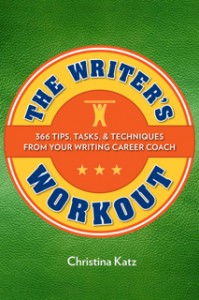In my latest full-length book, The Writer’s Workout, I discuss in detail how every writer must produce his or her own career.
I took that concept and I broke it down into increments, 366 to be exact, so that a brand new writer, a young writer, or an inexperienced writer could get a better idea of what might be ahead.
The book is also for experienced writers, who find themselves overwhelmed and wondering what to do next. The premise of the book is that writing is a workout, yes, but also that you can build your writing career on stone, not sand, so you can preserve in the long run and benefit from every asset you offer over time.
We used to live in a world where time was the enemy of writers, and writers paid a huge price for this. Look at an F. Scott Fitzgerald or an Ernest Hemingway. The pressure on them was to hurry up and be brilliant or die, and like many writers they were often torn between the two.
We often blame the weak constitution of writers for their frailties without looking at the bigger, unforgiving corporate system that is beating the creative drum at an impossible pace. Today, we hear writers talk about this more openly. We have magazines like Jane Friedman and Manjula Martin’s Scratch magazine. We have authors who are brave enough to transparently share their truths, so we can all be smarter for it, like Joe Konrath or Amanda Hocking. We have writers like me who are determined to teach writers how to successfully partner with others without all the self-sacrifice and personal losses for professional gain, while coaching writers to keep more of their profits from their hard work in the long run.
But what we still don’t have is a more humanistic publishing industry and this is ultimately the problem. Until we have a publishing industry that actually partners with authors instead of leveraging them, I don’t expect good things to happen in the industry.
At this point, writers are expecting to be treated like human beings not commodities and I think it’s okay with most of us if anyone who doesn’t treat us this way goes away.
I believe we have now reached a tipping point, where there are enough good, helpful, caring people out there making legitimately good things happen for writers that it should no longer be necessary for writers to sacrifice their souls to get ahead.
The tools are available today to build something solid from the get-go. I teach writers how to do this every day and the rewards for this positive, constructive seeding are probably going to be much, much bigger than I can even possibly imagine.
I am good with that. I am happy with the idea that all of my hard work today is going to pay off big time tomorrow for myself and my students. We are not in a rush. We are building slowly, surely, and wisely.
For all of those, who are on the verge of “paying your dues,” or “doing what you have to do to get a ahead,” or who feel so desperate that you would enter into agreements you might not otherwise make. Take pause.
And then don’t do it. Don’t do any of it. You don’t have to anymore.
Read The Writer’s Workout instead. It will give you 366 better ideas.
And at this crucial juncture in publishing history, we need as many better ideas as we can get.
And if you have been slowly building over the years despite the pressure to do more faster, then congratulations. Your time is coming. And it’s almost here.
Having a platform means that every writers is a multi-media company. And if you are treating yourself and your work as less powerful than this, then you may need an attitude adjustment.
Last time I checked, large, profitable multi-media companies were not born overnight. So grow yours slowly over time, and then hopefully, you too can become part of the positive, constructive movement that treats writers like human beings, instead of like commodities.
If you work hard on your career and your platform, someday you will be a professional force to be reckoned with, and you can’t be afraid of your own professional power. You have to go for it.
So go ahead and go for it! Slowly, wisely, and consciously. You will thank me later.
